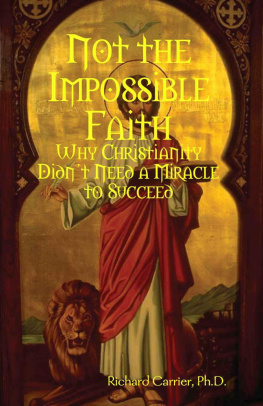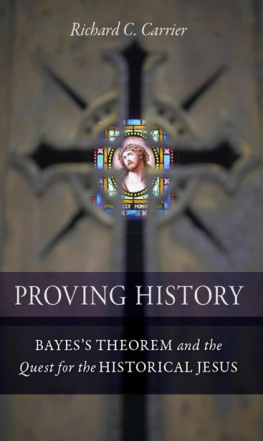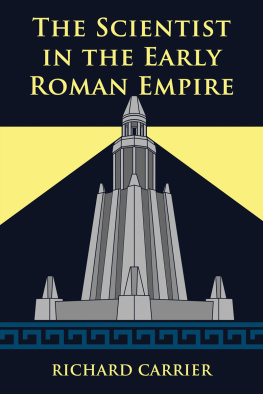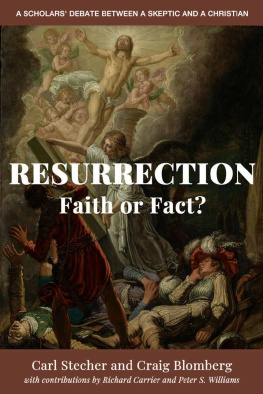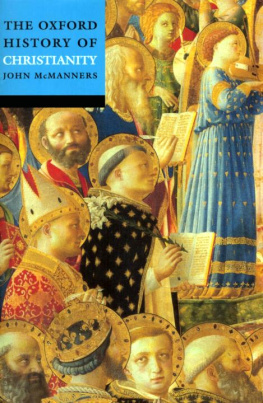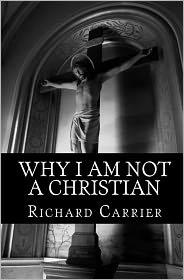Not the
Impossible Faith
Why Christianity Didnt Need a Miracle
to Succeed
by
Richard C. Carrier, Ph.D.

2009
For my fans. Keep fighting
for the truth, against error,
distortion, and lies.
Not the Impossible Faith:
Why Christianity Didnt Need a Miracle to Succeed
Copyright 2009 by Richard Carrier, Ph.D.
All Rights Reserved
Published by Lulu.com
www.richardcarrier.info
Contents
Introduction 7
The Dark Horse Rides 7
The White Knight Responds 8
Dark Horse Dead in the Water 9
1. Who Would Believe in a Crucified God? 14
Precedents and Distinctions 14
How Converts Differed from Critics 22
How Things Really Looked 29
Many Expected a Humiliated Savior 33
Conclusion 45
2. Who Would Follow a Man from Galilee? 47
Two Key Problems 47
Getting the Context Right 50
A Working Class Rabbi 52
The Galilean Connection 61
The Gospel of John 65
Holding Steps into a Trap 70
The Role of Messianic Prophecy 73
Why a Virgin Birth? 75
Conclusion 79
3. Was Resurrection Deemed Impossible? 80
The Popularity of Resurrection 80
Defending the Zoroastrian Connection 86
Debating Zalmoxis 97
How the Pagan Mission Changed Christianity 103
Jewish Background 112
Was There a Better Idea? 115
Conclusion 119
4. Was the New Always Bad? 120
5. Who Would Join a Moral Order? 125
Pagans Are Moral People Too 125
Christians Arent Perfect Either 129
The Appeal of Communism 131
Conclusion 133
6. Who Would Join an Intolerant Cult? 136
The Popularity of Intolerance 136
First: Statistics 138
Second: Systemic Failure 141
Demons & Elite Corruption 142
Managing the Family 144
A Stigma of Atheism? 146
Which Is It, Jews or Judeans? 148
Conclusion 149
7. Was Christianity Vulnerable to Disproof? 150
General Argument 150
The Problem of Differing Research Paradigms 153
The Problem of Lukes Methods as a Historian 164
First Example: Luke on Pauls Trial 180
Holdings Argument Backfires 185
Second Example: Luke on Agrippas Cause of Death 190
Public Miracles & the Problem of Finding Witnesses 195
Summary 203
Conclusion 206
8. Who Would Want to be Persecuted? 208
The Social Foundations of Martyrdom 208
Paul and Tertullian 215
Where Holding Gets it Wrong 221
What Hebrews Actually Says 227
Where Holding Gets it Right 232
Conclusion 233
9. Was a God Incarnate Always Repugnant? 235
Incarnation Among the Jews 235
Incarnation Among the Gentiles 241
Conclusion 242
10. Would Groupthinkers Never Switch Groups? 245
Getting it Backwards 245
What Do Malina & Neyrey Really Say? 248
How Christianity Fits the Malina-Neyrey Model 260
Malina and Neyrey on the Role of Revelation 270
Lack of Evidence for Holdings View 274
Conclusion 281
11. Did No One Trust Women? 283
There Is No Evidence Women Were a Problem 283
The Testimony of Women Was Trusted 286
Why Mark Places Women at the Empty Tomb 299
Conclusion 305
12. Did No One Trust Illiterate Laymen? 307
13. Would the Facts Be Checked? 313
Boiling away the Hyperbole 313
The Conversions in Acts 317
The Evidence as Reported in Acts 326
The Indications from Early Apologists 338
Conclusion 353
14. Who Would Follow an Ignorant Savior? 356
15. Who Would Follow an Executed Criminal? 360
16. Were Christian Teachings Too Radical? 362
Fallacies Galore 362
Misrepresenting MalinaAgain 365
Conclusion 370
17. Did Christians Encourage Critical Inquiry? 371
Holdings Bogus Evidence 371
Method as Revealed in Paul 374
Survey of Passages Relating to Method 378
The Bankrupt Methods of J.P. Holding 385
The Last Ditch 389
Conclusion 391
18. How Successful Was Christianity? 393
Assumptions 393
Numbers: What the Texts Say 397
Numbers: What the Experts Say 410
With Whom Did Christianity Begin? 418
The Rise of World Christianity 425
Conclusion 430
Introduction
A common apologetic argument for the truth of the Christian religion is that its origins were too improbable for it to be false. This argument has appeared in many forms over the years, but most of the usual ideas are combined into a single popular effort by James Patrick Holding (alias Robert Tur-kel), a Christian minister and one-time prison librarian. J.P. Holdings argument is that the origin and success of Christianity in the ancient Roman Empire was so improbable it must have been based on a true story of the resurrection of Jesus Christ. This book refutes his argument. But in the process, it educates the reader on numerous fascinating aspects of ancient religion, history, society, and culture, and explains in entirely natural terms why Christianity was a successwhen it actually was.
The Dark Horse Rides
J.P. Holding is something of a dark horse in the apologetics community. He is very popular online. I often travel the country, speaking to humanist groups near and far, and I always meet people who know his work. They are usually Christians once seduced by his rhetoric who later lost their faith upon discovering how horribly hed misled them. Its perhaps not surprising then, that professional Christian apologists seem inclined not to associate with him. I suspect they dont want to be seen as endorsing his shoddy research, unprofessional demeanor, and unrepentant reliance on fallacious argument. Indeed, he insults whoever exposes his errors, and often responds by simply making things up.
Originally, J.P. Holding had assembled his arguments in a lengthy and rambling online effort, which he constantly edited whenever criticized (so establishing its original text was no easy matter, though as he now presents it in five languages I assume he doesnt edit it much anymore). He clearly doesnt want his readers to know where to find them or ever read them. That all but amounts to an admission of defeat.
The White Knight Responds
My original critique is still available online.
The book you now have in your hands reproduces my entire critique still catalogued on the Secular Web, but is revised in three respects: Ive added this new introduction; Ive taken what is still in Chapter 19 online (Responses to Critics) and re-integrated all that material into the other chapters where it belongs (so here there are only eighteen chapters); Ive edited everything in various ways; and often what was an endnoted digression now appears in the main text. Some notes have also been deleted, others added, and many sections partly rewritten. But more than all that, as a book this can now be carried around, handed to friends, written in the margins, and actual page numbers cited.
In the following eighteen chapters I will compare Holdings claims and arguments with the actual facts of ancient history, identifying errors in his research, fallacies in his reasoning, and his frequent (I suspect deliberate) distortion of the facts. Holding presents seventeen factors where Christianity did the wrong thing in order to be a successful religion and concludes from this that the only way Christianity could succeed under those seventeen hostile conditions was because it was a truly revealed faith, in particular because it had the irrefutable witness of the resurrection behind it. Each of those points will be addressed in its own separate chapter, with a final chapter on a more general point pervading all the others.
Next page
